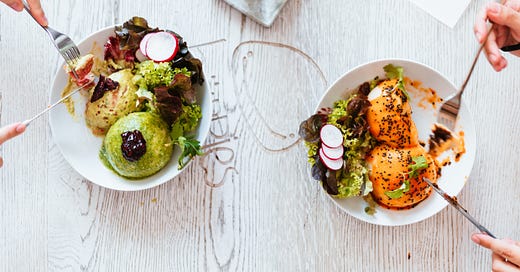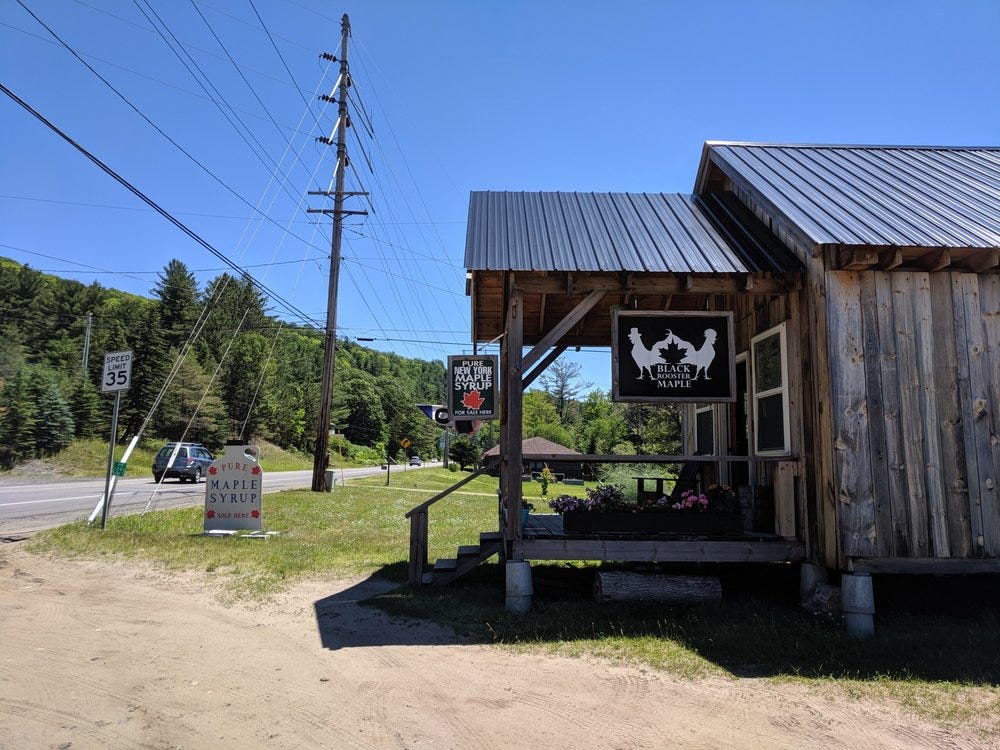If you enjoy the newsletter today, please forward it to someone who’d enjoy it, and tap the heart icon above, which will help me reach more readers. I appreciate your help, y’all!
Also consider signing up for a paid subscription. The money goes toward paying our contributors around the world. Substack sets the minimum at $5/month, so you can't give less than that,* but please feel absolutely free to give more. (You can choose any amount in the “supporter subscription plan” field.)
*If you would like to give less than $5, you can do that via Patreon, and it is very helpful and appreciated! You can give just $1/month, and you’ll get podcast episodes one week early.
Diversity in Native American Food with Loretta Barrett Oden
I’m absolutely over the moon that I got to interview Loretta Barrett Oden for the podcast. She’s a chef and member of Citizen Potawatomi Nation who has studied the foodways of North and South America - which has proven useful as she creates a pan-Oklahoma (39 Nations!) menu for the new First Americans Museum. Her thoughts on fry bread are ... nuanced. "Native American food" is incredibly diverse.
You can listen to Smart Mouth on iTunes, on RadioPublic, on Spotify - or any other podcast player!
Ottawa’s Greatest Invention
As Canada’s capital city, Ottawa hosts world-class galleries, museums, and historic sites.
But the way locals see it, the heart of their city isn’t a magnificent building or stately monument. Instead, their true cultural identity rests with a couple of shacks that are precariously perched on ice and snow.
These humble huts serve up Ottawa’s favorite treat, the BeaverTail. Rest assured, a BeaverTail has nothing in common with the feisty aquatic rodent save for its flat, oblong shape. Made from stretchy whole wheat dough that’s deep-fried, slathered in butter, and dredged with cinnamon and sugar, BeaverTails are a drippy, oozy, sticky mess of a snack. They’re the last thing you should eat while needing woolly mittens, but that’s when Ottawans like them best.
Ottawa residents crave BeaverTails during the deepest, darkest days of winter, even though the sweet treat is available year-round at 150 locations. When the temperature plummets, sometimes reaching negative 40 degrees, everything in the city freezes, including the foundations of the mobile BeaverTails huts positioned in the icy Rideau Canal. For a few short, glorious weeks, the city’s main waterway transforms into the world’s largest skating rink. The moment the skateway opens, bureaucrats glide downtown to work, new citizens gingerly test their ice legs for the first time, and kids run fearlessly, skate blades clomping as they cut into the crusty, frozen surface. And everyone lines up for BeaverTails.
Photo: snowpea&bokchoi / Flickr
People dance to keep warm. Chilly patrons take care not to trip on ruts, a byproduct of thousands of impatient feet. The only thing heated is the debate over toppings. Popular orders include the Bananarama (chocolate hazelnut spread and banana slices,) Pecan Pie (maple spread, chopped pecans, and chocolate drizzle), and the Avalanche (cream cheese with Skor bits and caramel sauce). Out-of-towners will earn a subtle nod of respect if they opt for the Killaloe Sunrise. This sentimental local favorite, so named for the nearby town where BeaverTails debuted in 1978, adds a squeeze of fresh lemon juice to the traditional cinnamon-sugar topping. Other flavors may come and go, but it’s the Killaloe that indecisive residents reach for again and again.
No matter the choice, you’re guaranteed to be coated in butter, sugar, and pastry crumbs after just one bite. Eating BeaverTails on Ottawa’s Rideau Canal is messy, sticky, and occasionally a nearly hypothermic adventure. It’s also as local an experience as it gets and Ottawa folks wouldn’t trade it for all the museums in the world.
Fun with Germknödel
Berlin’s sophistication is very low-key. Though it’s an international city where most everyone is at least bilingual and huge decisions about both state and commerce are made constantly, it doesn’t have the level of hustle and bustle that comparable cities have. Here, people leave time to sunbathe on their lunch break and pick up their kids from kindergarten. Accordingly, some of the trendiest restaurants are quiet and small and friendly. The appropriately named häppies sells vegetarian (so many vegetarian restaurants in Berlin) dumplings that are ostensibly germknödel, a Germanic yeasted dough usually filled with plum jam and topped with sugar and poppy seeds. This restaurant uses whatever fillings it wants. Like spicy soy and figs, topped with sesame seeds, chili sauce, and cilantro. Or mushrooms, miso, and long pepper with “tahini pesto” and beet chips. They’re all a little interesting and very comforting, and quite tasty. Dunckerstraße 85, 10437 Berlin, Germany. Website. -Katherine Spiers
Photo: Emanuel Tanjala / Alamy Stock Photo
Honor System Farm Stands Are Perfect for a Pandemic
By Laura Wheatley
While driving through the Adirondacks in New York recently I was delighted to see a quaint little hut of sorts on the roadside. All I was able to read as I drove past were the words “maple syrup,” but that was enough for me to turn the car around and check it out. As I stepped into the tiny farm stand I was greeted by rows of glass bottles glowing amber in the sunlight. My curiosity was heightened when I noticed a pile of cash next to a lock box with a sign that read “Please make your change as needed. Thank you!”
My instant reaction was a warm, fuzzy feeling knowing that I was being trusted to do the right thing, which I appreciated almost as much as the maple syrup itself. It had been a while since I had seen an honor system farm stand and it got me wondering how they were surviving during the pandemic.
Photo: Yelp
Since no one was there I called up one of the owners, Kristy Bassarab, who runs Black Rooster Maple with her husband, Kirk. Turns out, their business has been thriving, as it has at other honor system stands in the region. She thinks it can be explained by the huge increase in tourism to the Adirondacks, which people view as a safe place to escape to, with access to social distancing activities such as hiking.
Some farmers and local producers have used this system to sell their goods for hundreds of years, as it’s both cost-saving (no need to pay someone to man the booth) and time-saving (they can focus on the many other jobs around the farm). And of course now, they are the definition of socially distant.
According to Kristy, people who haven’t seen this model of farm stand before are surprised that the owners are so trusting. She’s had very few incidents of theft throughout the nine years of operating on the honor system. In fact, studies have shown that people get a burst of oxytocin when they get signals that they’re trusted. Happiness and maple syrup: sounds like a great deal.
More Food Reading:
Very thoughtful piece by Smart Mouth contributor Hannah Selinger about her time working for David Chang. She’s definitely clocked how he always “comes clean” right when he’s about to get canceled. He’s savvy as hell. (Except when he’s screaming at employees, which two friends of mine, when eating at his restaurants, have seen him do.)
Here’s another food newsletter you should subscribe to: It’s written by two very talented women who are ostensibly food writers, but really they cover under-represented cultures. Also they’ve recommended my podcast …so you know they’re classy, intelligent, and alluring, too.
This newsletter is edited by Katherine Spiers, host of the podcast Smart Mouth.
A TableCakes Production.
Want to contribute? Here are the submission guidelines.










Beaver Tails are a helluva pastry!